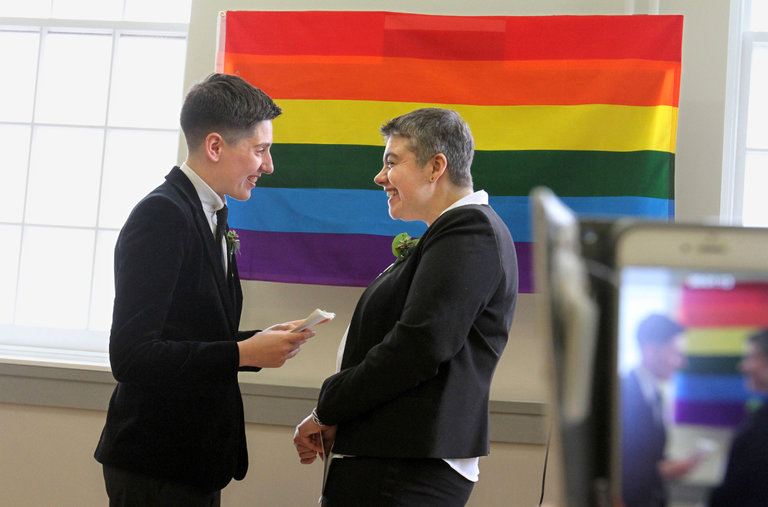Kira Meskin and her fiancé, Yaniv Schiff, both of Chicago, are so committed to gardening, composting, cycling and recycling they are incorporating these sustainable elements into their Sept. 15 wedding.
“We try to live a more conscious lifestyle in our daily lives,” said Ms. Meskin, 35, an occupational therapist. “In terms of our wedding, we’re looking to create a celebration that also reflects our interests and values.”
As part of their 215-person wedding, Ms. Meskin and Mr. Schiff, 36, a director of digital forensics at QDiscovery, a provider of electronic data, have decided to give guests Hoya kerrii plants as party favors. But that’s not all. Alongside 25 friends, they plan to bike from home to their reception at Salvage One, a Chicago events space that also sells pre-owned architectural elements and vintage furniture.

CreditJacob Moreland, Two Birds Photography
Since their Oct. 30 engagement, the couple selected like-minded businesses that they found through Chicago Vintage Weddings, an eco-friendly wedding planning company, and Green Wedding Alliance, a collaborative network of socially and environmentally responsible event vendors.
Their florist, Pollen Floral Design, donates post-party flowers to nonprofit fund-raising groups, community dinners, and volunteer workshops that transform florals into bedside arrangements for nursing homes, hospice and hospitals. Erickson Design, which they are using, prints save-the-dates and other wedding stationery in-house, using paper made from recycled post-consumer materials. Its founders are also committed to planting a tree for every set of invitations they produce.
Of their choice of wedding vendors, Mr. Schiff said, “I haven’t gotten the impression that they are more expensive than non-green vendors. But, also, the slight possible increase in cost is worth it for us.”
Ms. Meskin and Mr. Schiff also researched eco-conscious dining options. FIG Catering, their food vendor, caters 50 to 70 weddings each year. To minimize food waste, Molly Schemper, the owner, analyzes purchasing practices and preparation, and trains her staff to recognize sustainable presentation methods.
“If we’re getting carrots with greens on the top, we use those greens in some sort of way,” said Ms. Schemper. Ingredients that are typically cast aside are sometimes used for stocks, sauces, soups, bitters and cordial drinks.
FIG Catering produces buffets upon request. However, to minimize waste, the staff doesn’t fill up the table with excess food that might go unconsumed.
“If things go out on a buffet, or are served family-style, there’s no way to salvage that,” said Ms. Schemper, who donates untouched, unserved fare to local food pantries. “Those styles of service produce more waste than a plated meal, where we’re only sending out what people are going to eat.”
Between 30 and 40 percent of America’s food supply becomes food waste, according to the Department of Agriculture. Ms. Schemper says her business produces less than 5 percent food waste on-site. She estimates the wedding industry’s average is 15 percent.
FIG Catering charges $100 to $250 per person, depending on whether chairs, tables and plate rentals are also necessary, according to Ms. Schemper. (By comparison, the average cost of wedding catering in the United States is $40 per person, or $27 a person if it’s a buffet, according to the Wedding Wire.)
Robyn Bruns, the owner of Red Letter Event Planning who plans 15 weddings annually, recommends that clients forgo paper plates and plastic cups and use nondisposable tableware and glasses instead. “The rental companies are buying it once, and they’re renting it out to hundreds of people over the course of a year,” she said. “Yes, it has to be cleaned and has to be transported, but you’re not throwing anything away into the landfill.”
Ms. Bruns, who lives in Coeur d’Alene, Idaho, also pushes for the use of repurposed décor. Brides and grooms can buy pre-owned candlesticks, dessert platters and ceremony arches (to be sold again after the wedding).
Wedding Recycle and BravoBride offer tablecloths, signs, vases, and bridesmaid shoes, among other items, that have already been used in other weddings.
In addition to centerpieces and accessories, tuxedos and gowns can also be reused. Websites like the Black Tux and Preowned Wedding Dresses offer these types of rentals and purchases.
For in-person shopping, Brides For A Cause, with boutiques in Seattle, Portland, Ore., and Tacoma, Wash., accepts and resells donated dresses, as it raises money for charities. “You’re not creating something from scratch,” said Juliet Horton, the founder and chief executive of Everly, an online wedding planning platform in the Seattle area, Vancouver and Victoria, British Columbia. “The idea of getting a $200 dress, and it’s going to a good cause: Everyone’s winning on that front.”
Of course, some couples may also want a few new things. “Some people are not comfortable having an end-to-end sustainable wedding, but maybe, for them, it’s picking two or three things — flowers, desserts,” said Lindsay Mendoza, the founder of Conscious Vows, a sustainable wedding service based in Washington.
This might include biodegradable confetti. According to the on the online marketplace Etsy, there were 51,000 searches for it between January 2018 and January 2019, a 28 percent increase from the previous 12 months.
Continue following our fashion and lifestyle coverage on Facebook (Styles and Modern Love), Twitter (Styles, Fashion and Weddings) and Instagram.








